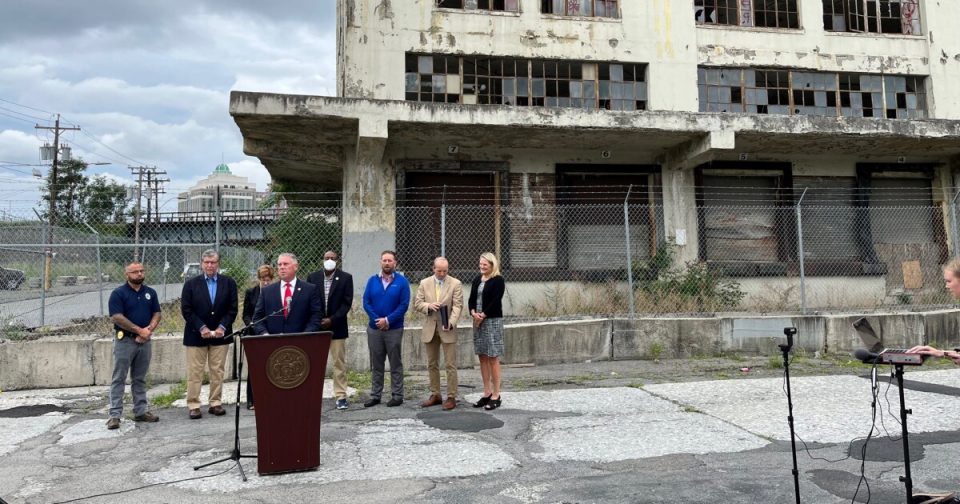State, county and city officials were outside Albany’s crumbling Central Warehouse Monday morning calling for the enactment of three bills that have passed both houses of the state legislature.
Monday’s press conference was the latest chapter in the saga of the asbestos-laden, 11-story, 70,000-square foot Central Warehouse building downtown, which needed emergency stabilization this month, leading to a city state of emergency declaration and several enforcement actions by the mayor last week.
The crumbling southern wall led to a city, county, state and federal response when it became unsafe for Amtrak trains to run on the nearby railway.
Albany County Executive Dan McCoy, a Democrat, says it would cost a small fortune to tear down the building.
“Dealing with this building for the last five years, but really last year in court, continue to be in court,” said McCoy. “Hopefully we’ll take ownership in October.”
The issue continues moving through the court system. The county has been at an impasse with the current owner, Evan Blum, who denies claims that he is an absentee owner without a real shot at redeveloping it.
State Assemblymember John McDonald, McCoy and Albany Mayor Kathy Sheehan say state bills awaiting the governor’s signature are relevant to the impasse and address landlord-tenant issues, including when local governments can step in to protect tenants’ rights.
McDonald, also a Democrat, says one involves the ROP or residential occupancy permit program:
“The bottom line is, an ROP is required of a landlord to have the city code department inspect a unit for rental prior to when it’s being occupied,” McDonald said. “I always called it when I was mayor the Good Housekeeping seal that this unit is safe and ready to be rented. Unfortunately, not every landlord understands that process, most do, but probably in most communities, 20 to 30% of units get rented, tenants aren’t aware of it or rent these units are rented without the proper ROP.”
McDonald says the second is a receivership bill that authorizes tenants and local officials to commence special proceedings to have an administrator appointed when their residential units are not being properly maintained by landlords.
The third directly speaks to the Central Warehouse eyesore. It authorizes special proceedings to convey title to abandoned commercial and industrial property to a city, town, or village, such as the warehouse, which has been vacant and has continued to deteriorate for decades.
“I would dare say, if this was in law 10 or 15 years ago, this would have been a great opportunity for local government to follow the very closely delineated process to take title of the property and salvage it,” said McDonald. “Unfortunately, now the city, the county, and the taxpayers are looking at shouldering some significant costs, irrespective what the final outcome might be.”
Wade Beltramo is General Counsel at the New York Conference of Mayors.
“None of these bills are a panacea,” Beltramo said. “Dealing with problem properties like this is very difficult, and it’s a huge challenge. It’s just one of the many tools that we need to help deal with these properties.”
Officials say the three bills have passed both houses and are expected to be approved by Democratic Governor Kathy Hochul. Hochul’s office says he will review them.


